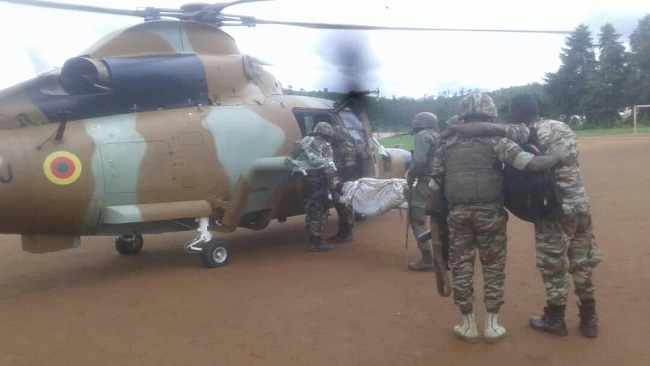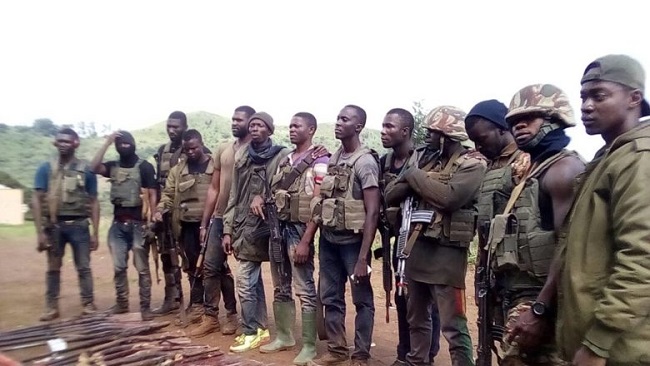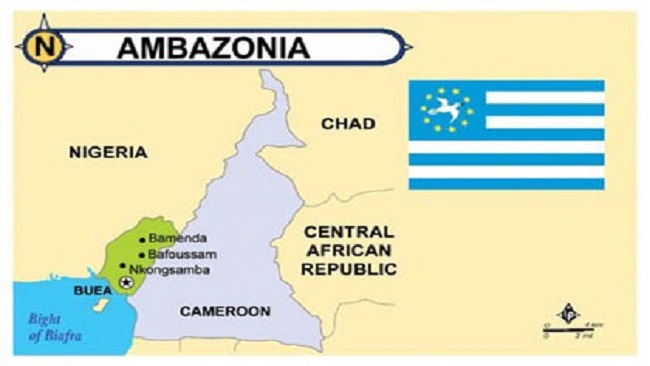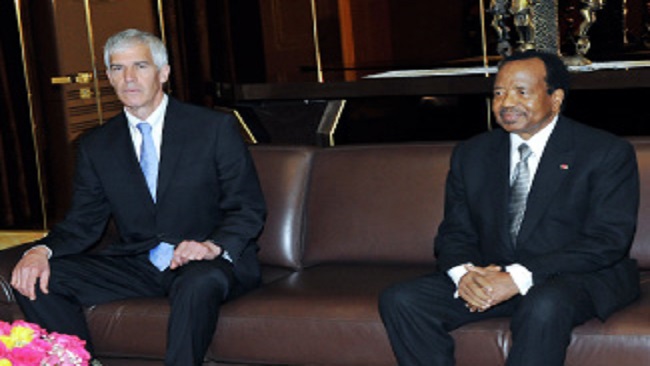8, February 2019
Attack on Lebialem County: How Biya failed to get Field Marshal 0
French Cameroun troops stormed bases and strongholds of the Red Dragons across Lebialem County. But the Francophone soldiers who have killed many innocent Southern Cameroonian civilians with the rogue Paul Biya regime providing them sanctuary were running for their lives. French Cameroun President Biya ‘s expression of La Republique’s desire to neutralize the Field Marshal seemed not to come true.
The battle for the Lebialem County had been conceived as a swift campaign with a single objective: defeat the Red Dragons and destroy the Grand Manyu Resistance by capturing the Field Marshal and other key leaders. A unique combination of BIR power, France and French Cameroun intelligence and special operations forces teams and indigenous CPDM allies failed to sweep the Red Dragons from control of the Lebialem County.
While keeping the Cameroon army’s deaths to a minimum, Yaounde is aware that the mission failed to capture or kill the Field Marshal. The failure to capture the Field Marshal represents a lost opportunity for the Biya regime that will forever alter the course of the Southern Cameroons conflict and quest for independence.
The Invasion of Lebialem County was reportedly led by General Buba of the French Cameroun army. Ambazonia Restoration Forces mounted the resistance when the invading French Cameroun army soldiers left Chief Forminka to Esoh Atah. Our correspondent in Menji revealed that a French Cameroun regiment from Arulakeng that braved the bad roads to Esoh were ambushed by the Dragons. Another French Cameroun army deployment from Azi to Nkah also came under attack.
The bodies of several Francophone soldiers killed during the Lebialem onslaught have been moved to a mortuary in Dschang. We gathered that the Biya regime is planning a more sophisticated raid with helicopters soonest.
By Soter Tarh Agbaw-Ebai with files from CIR Lewoh Desk



/arc-anglerfish-arc2-prod-mco.s3.amazonaws.com/public/RS25L4VFRFDCHKLYTOF6MOX5N4.jpg)





















9, February 2019
US Officials Tout Good Ties with Cameroon Despite Aid Cut 0
Despite announcing plans to trim military support for Cameroon’s government over its alleged human rights violations, key U.S. officials say the United States will continue partnering on security efforts. But a Cameroon official contends the cutback could jeopardize the fight against extremism in the region.
U.S. Ambassador Peter Henry Barlerin assured that the U.S. was “not going to stop security cooperation with Cameroon,” the Associated Press reported him saying, after he met Thursday with Cameroon government spokesman Rene Emmanuel Sadi.
“Relations between Cameroon and the United States are excellent and longstanding,” Barlerin said, “and we aim to continue that relationship.”
His comments in Yaounde, the capital, came after it was reported Wednesday that the U.S. government was cutting about $17 million in military aid to the government of President Paul Biya.
Also Thursday, the head of U.S. Africa Command, Marine Corps General Thomas Waldhauser, said at a Senate Armed Services Committee hearing in Washington that Cameroon has “been a good partner with us counterterrorism-wise, but you can’t neglect the fact that … there are alleged atrocities,” The Washington Postreported.
Waldhauser also told the committee that Africa Command would sustain its mission “to train the counterterrorism forces in Cameroon that deal with Boko Haram,” the Islamist militant group.
The Pentagon has roughly 300 U.S. troops engaged in training and aiding Cameroonian security forces.
The State Department and Pentagon “recently assessed our security relationship with Cameroon,” according to a State Department email sent to VOA Thursday (and shared a day earlier with The Washington Post.)
Despite “the great cooperation” in fighting Boko Haram and “in restoring maritime security in the Gulf of Guinea,” the email said, the U.S. government has “terminated” funding for four defender-class boats, nine armored vehicles, a radar system and helicopter training, among other things.
“We do not take these measures lightly, but we will not shirk from reducing assistance further if evolving conditions require it,” the State Department email said.
It added that the measure was intended to press Cameroon “to show greater transparency in investigating credible allegations of gross violations of human rights security forces, particularly in the northwest, southwest and far north regions.”
Cameroonian security forces – grappling with Boko Haram in the far north and the Ambazonian separatist movement in two English-speaking regions in the west – have been accused of committing serious violations against citizens.
“Cameroonian security forces have indiscriminately killed, arrested and tortured people, firing on crowds, displacing thousands of civilians, and destroying entire villages with impunity,” Adotei Akwei, an official with Amnesty International USA, said Thursday in a statement responding to the U.S. decision.
Cameroon’s government, in a statement Thursday, said it “strongly denies accusations that U.S. military assistance has been used to commit human rights violations. While we have acknowledged instances of human rights violations, they have been investigated and prosecuted through proper judicial channels.”
Last year, Cameroon’s government rejected a report by Amnesty International, saying its accounts of torture at the hands of security forces amounted to “a web of false allegations.”
The current Amnesty International statement urged the Trump administration to “press other donors of security assistance to review their programs and insist on accountability and reform within the Cameroonian security forces.”
France announced Thursday that it would maintain its support.
“France is bound by a defense partnership agreement that it conducts according to the international standards,” French foreign ministry spokeswoman Agnes von der Muhll told reporters at a daily briefing, Reuters news service reported.
A spokesman for the Ambazonian separatist movement also praised the U.S. move and encouraged other Western countries to pull back support, too.
“What the U.S. has done, it came a little bit late – but we appreciate it and we hope that every European nation [and] Canada will follow suit,” Chris Anu, the movement’s secretary of state, told VOA. “Because if that is not done, the regime in French Cameroon will decimate everything that is in southern Cameroon before the world comes to know about it.”
VOA